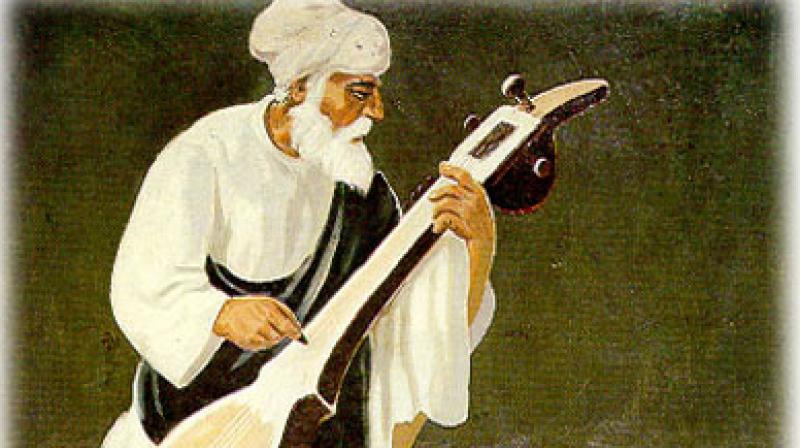Mystic Mantra: Mardana The first Sikh
Bhai Mardana, born in 1459 in a Muslim family, was a life-long companion of Guru Nanak.

I reside where you reside O Mardana!” says Guru Nanak. In Sikh history and religion it is impossible and rather unthinkable to remember Guru Nanak without Mardana.
Bhai Mardana, born in 1459 in a Muslim family, was a life-long companion of Guru Nanak. He was 10 years elder to the Guru and they grew up in the village of Talwandi Rai Bhoe, now known as Nankana Sahib in Sheikhpura district of Pakistan. Bhai Mardana belonged to the Mirasi caste — community of Bards. “Miras” means heritage and a Mirasi was supposed to be the custodian of “Miras” or heritage. In the Sikh religion, Bhai Mardana played the role of a true custodian of Guru Nanak’s ideas, principles and faith.
Bhai Mardana was named “Dana” by his parents and it was Guru Nanak who renamed him as “Mardana” (warrior). Guru Nanak, during his childhood, had given Mardana a simple string instrument made from reeds to play while he sang the hymns. When Guru Nanak started working with the Nawab of Sultanpur Lodhi, Mardana went to meet him but never came back. He accompanied the Guru on his spiritual journeys across India and abroad. It was the beginning of a wonderful relationship, one playing the Rabab and the other singing the praises of God. Bhai Mardana was, in fact, the first Kirtania of the Sikh religion.
The relationship and bond between Guru Nanak and Mardana is very symbolic and significant. It is sacred but reflects upon the everyday mundane life as well. In the Janamsakhis, Mardana represents this worldly affairs like hunger, desires, need for shelter, etc. Guru Nanak is the other worldly manifestation of truth. Once Mardana felt very hungry and needed something to eat. Guru Nanak asked him to go the nearby village and satisfy his hunger. The villagers served him well and gifted him a number of things. Mardana returned to the Guru with a big bundle.
When Guru Nanak saw this he rolled on the ground laughing. Mardana realised his mistake and threw the bundle, which in fact was an unnecessary burden of desires and greed. Guru Nanak’s philosophy is portrayed through these journeys in an extremely simple and practical manner, without any heavy discourses and sermons. In almost all the journeys Mardana raises certain doubts or encounters, certain situations typical of this world. Guru Nanak in a simple manner provides clarifications and solutions.
In the company of the Guru, Bhai Mardana acquired the traits of a Gurmukh — the one oriented towards the Guru. Three of his hymns are included in the Adi Granth under Raag Bihagra. These hymns denounce the evil practices like drinking and differentiate between Gurmukh and Manmukh — the one oriented towards the world. Mardana is the only Sikh who could use Guru Nanak’s name in his hymns as Mardana Nanak.
Bhai Mardana did not care for the restrictions of the organised religion. When Pir Julaali’s son Jul Julaali asked Bhai Mardana not to play the Rabab, he replied that he was singing the hymns of the Guru and would not stop. During one of the journeys, when Mardana fell very ill, Guru Nanak asked him about the performance of his last rites. Since he was a Muslim, the Guru asked about his wish. Bhai Mardana replied that in the company of the Guru he had overcome the pride of his body and was no longer attached to it. He asked the Guru to do as he wished. In 1534, Bhai Mardana breathed his last at Kartarpur.
Bhai Mardana had all the qualities of a Gursikh. He was child-like and pure in his conduct. He was the first Sikh, the first Kirtania and the first Rababi of the Sikh religion. Above all he was a friend, a disciple and a companion of Guru Nanak. Bhai Gurdas says, “Ek Baba Akal Rup Dujja Rababi Mardana (There was Guru Nanak as the manifestation of the supreme being, and along him was Mardana, the musician).”

